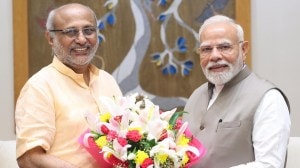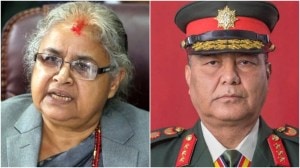Annie Ernaux, recipient of the 2022 Nobel Prize in Literature, on her writing life and the highs and lows of old age
On her first visit to India, the writer is the headlining act in a 16-member delegation of authors representing France, the guest of honour at the New Delhi World Book Fair
 Nobel laureate Annie Ernaux (Express Photo By Amit Mehra)
Nobel laureate Annie Ernaux (Express Photo By Amit Mehra) Her Nobel citation lauded Annie Ernaux, winner of the Nobel Prize for Literature 2022, “for the courage and clinical acuity with which she uncovers the roots, estrangements and collective restraints of personal memory”. For nearly five decades, the French memoirist and writer of works such as A Man’s Place (1983), A Woman’s Story (1987), Shame (1996) and the much feted, The Years (2008), has turned the art of the memoir, into an act of healing and an awareness of one’s place in the world. In India for the first time, the writer who lives in Cergy, on the outskirts of Paris, speaks of how she began writing and the best days of her life. Edited excerpts:
What prompted you to take up writing? Was it a need to document your life for yourself?
What made me write in the beginning was a deep sorrow which had been there for two years, which you could say was a terrible love story (her marriage to Philippe Ernaux had been unravelling at the time), something that might even resemble a rape. Then two years later, I wrote a book that hasn’t been published. Then I started writing again after 10 years with new motivation. This time, I believe it was about documenting — there was so little known about my childhood, my adolescence, not even where I was born, my origins in society, the moment I completed my studies. I was going from this world to a whole new one, which was changing me as a person. There’s a rule that says that before writing, things are not clear, they are amorphous, so you need to give it a form and find meaning in it. Is it something that gives me form? I’m not sure that it does, but it creates something — a book — and gives life to something that concerns me, but not just me at the same time. It transforms my perception, not just about me but about everything in the world.
One reads so much about your ‘flat style’ but can language ever be truly neutral? What made you remove yourself from a genre that is centred on personal experience? Did it make space for you to look at your life and the stories you wanted to tell from a distance?
You are right, language is never neutral. My choice was to eliminate from my writing all that resembled sentiments and emotions. I always tried to express what I feel, but not necessarily to sound beautiful. So when given a choice between words which are beautiful or elegant and words which are fair, I would go for what’s fair.
As a writer, did you have to cultivate this distance from memory, experience, and history? In The Years (2008), you never use the subjective “I” even as you write of your life and the changes in France for more than half a century.
My idea was never to write an objective story of France. I had lived through these years. I could not separate myself from the evolution of the world or the evolution of France. There was a world within me and I was within the world so there was an interaction between the two. So, in the story, I had a vision about what I wanted to do, but I didn’t want to write it subjectively, like an autobiography because when we write an autobiography, we write about ourselves. But this was life within a story, so I removed the subjective elements from the story, so it appeared like a consciousness through the eyes of a third person.
You have seen the evolution of feminism over the years. What is your opinion of the feminist movement today, in the light of the #MeToo movement, for instance, or, the fact that there has been a pushback against many of the hard-fought women’s rights in several countries around the world?
Our revolution is anew and it has pushed men to see what they are doing, to question themselves and this is something that hadn’t happened before. In the Seventies, women were fighting for their rights to contraception, sexual liberty, and other things. So there has been a remodelling of feminism that seeks accountability. In this new generation of feminism, which started in the 2000s, which seeks to question all that has come between men and women, what strikes me the most is that it has always been women who have had to fight for rights while men have always judged and written about women, never really questioning themselves.
The liberty of contraception, the liberty of clothes that are revealing, shouldn’t rest with men, it is for the woman to decide, she who has the power of giving birth. Yet, these continue to be shaped by masculine thought.
When you look back at your life, which decade would you say has been the most interesting?
For me, and for many women like me, or from my generation, it would be the Seventies, when we questioned ourselves about our existence. It was a time when we focused on things like contraception, abortion, the decision to give birth or not. There was a lot of fighting on upbringing, whether children — boys and girls — should be brought up in different ways or as equals, and on the stereotypes that existed in education. Then there was also the movement to legalise homosexuality so that it would not be taboo. Homosexuality was a crime in France till (President) François Mitterrand changed that in 1982. So, it was a time period that focused a lot on liberty and we were all seeking different lives. I felt deeply connected to it. I was in my late thirties, early forties then. That’s when I started publishing, which changed my life. It was like an épanoui (fulfilment).
One always tends to speak of one’s youth when one looks back. What are the struggles and joys of being in one’s eighties?
What a lovely question! It has certainly affected the way I see the world from how it was 10-15 years ago. The way in which you see things at this point in your life, you know that you will not be there forever. In France, when you talk about the future — in 20-40 years, we will be having this and that — I tell myself that I won’t be there. So, all this impacts the way you look at things. It makes you aware of the fragility of the world that surrounds you. It also changes the way that you see. You become more sensitive, more receptive to things. You hang on to things, but one day, and it seems almost suddenly despite the years, they vanish.
I have had certain health concerns, which not everyone else may have. I have seen people of my generation die, people even younger than me, which moves me and makes me compare life to a tree whose leaves are falling one by one. You don’t know at which moment which leaf is going to fall — that’s the struggle.
When it comes to pleasure, it’s the clarity of things — when I can distance myself from things and see them for what they are. For example, what the critics are saying about my work — it really is vain to think that I will change at this age. At this age, you discover new things, but you don’t change.
Another one of the pleasures is a long view of the past. My memory goes back to World War II, which implies that you can also see the coming back of things like the war in Ukraine. People of my age would know what it feels like to be of a time when World War II was happening. You want war to stop at any cost. This vision, this memory is something I got from my parents and grandparents who spoke of World War I and it is us who contain pieces of these stories.
(Translated from French into English by Ahan Mehrotra)
Photos



- 01
- 02
- 03
- 04
- 05



























